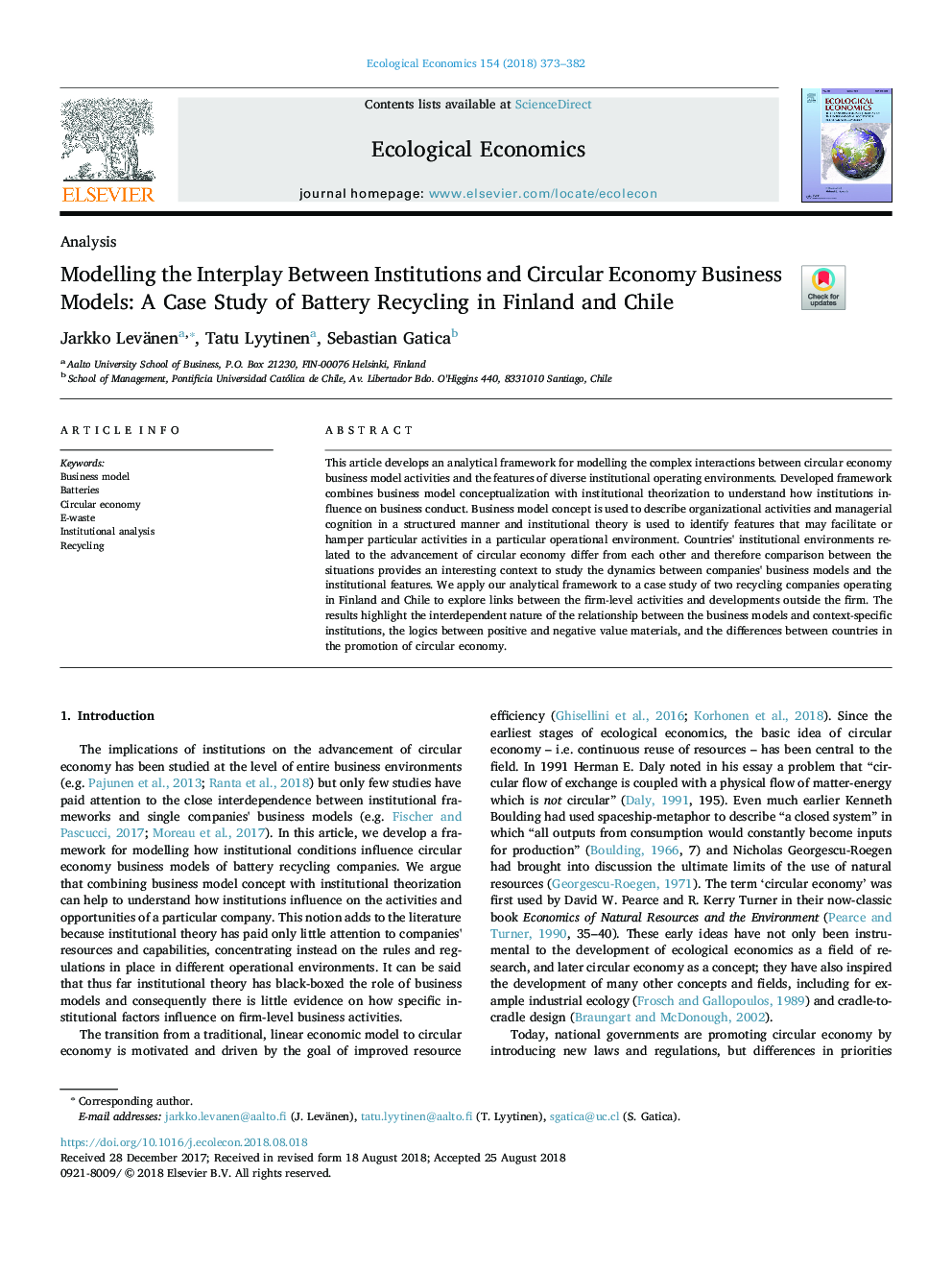| کد مقاله | کد نشریه | سال انتشار | مقاله انگلیسی | نسخه تمام متن |
|---|---|---|---|---|
| 11004758 | 1476325 | 2018 | 10 صفحه PDF | دانلود رایگان |
عنوان انگلیسی مقاله ISI
Modelling the Interplay Between Institutions and Circular Economy Business Models: A Case Study of Battery Recycling in Finland and Chile
ترجمه فارسی عنوان
مدل سازی تعامل بین موسسات و مدل های کسب و کار دایره ای تجاری: مطالعه موردی بازیافت باتری در فنلاند و شیلی
دانلود مقاله + سفارش ترجمه
دانلود مقاله ISI انگلیسی
رایگان برای ایرانیان
کلمات کلیدی
ترجمه چکیده
این مقاله یک چارچوب تحلیلی برای مدل سازی تعاملات پیچیده بین فعالیت های مدل کسب و کار دایره ای و ویژگی های محیط های عامل سازمانی مختلف را توسعه می دهد. چارچوب توسعهی، مفهوم سازی مدل کسب و کار را با نظریه نهادی به منظور درک اینکه چگونه موسسات بر رفتار تجاری تاثیر می گذارد، متصل می کنند. مفهوم مدل کسب و کار برای توصیف فعالیت های سازمانی و شناخت مدیریتی به شیوه ای ساختاری استفاده می شود و نظریه های نهادی برای شناسایی ویژگی هایی که می توانند فعالیت های خاص را در یک محیط عملیاتی خاص تسهیل یا متوقف کنند. محیط های سازمانی کشورها مربوط به پیشرفت اقتصاد مدور با یکدیگر متفاوت هستند و در نتیجه مقایسه بین شرایط، زمینه ی جالبی برای مطالعه پویایی بین مدل های تجاری شرکت ها و ویژگی های سازمانی فراهم می کند. ما چارچوب تحلیلی خود را برای بررسی مورد دو شرکت بازیافت که در فنلاند و شیلی فعالیت می کنیم برای کشف ارتباط بین فعالیت های سطح شرکت و تحولات خارج از شرکت مورد استفاده قرار می دهیم. نتایج، ماهیت متقابل وابستگی بین مدل های کسب و کار و نهادهای خاص را مشخص می کند، منطق بین مواد ارزش مثبت و منفی و تفاوت های بین کشورها در ارتقاء اقتصاد دایره ای.
موضوعات مرتبط
علوم زیستی و بیوفناوری
علوم کشاورزی و بیولوژیک
بوم شناسی، تکامل، رفتار و سامانه شناسی
چکیده انگلیسی
This article develops an analytical framework for modelling the complex interactions between circular economy business model activities and the features of diverse institutional operating environments. Developed framework combines business model conceptualization with institutional theorization to understand how institutions influence on business conduct. Business model concept is used to describe organizational activities and managerial cognition in a structured manner and institutional theory is used to identify features that may facilitate or hamper particular activities in a particular operational environment. Countries' institutional environments related to the advancement of circular economy differ from each other and therefore comparison between the situations provides an interesting context to study the dynamics between companies' business models and the institutional features. We apply our analytical framework to a case study of two recycling companies operating in Finland and Chile to explore links between the firm-level activities and developments outside the firm. The results highlight the interdependent nature of the relationship between the business models and context-specific institutions, the logics between positive and negative value materials, and the differences between countries in the promotion of circular economy.
ناشر
Database: Elsevier - ScienceDirect (ساینس دایرکت)
Journal: Ecological Economics - Volume 154, December 2018, Pages 373-382
Journal: Ecological Economics - Volume 154, December 2018, Pages 373-382
نویسندگان
Jarkko Levänen, Tatu Lyytinen, Sebastian Gatica,
